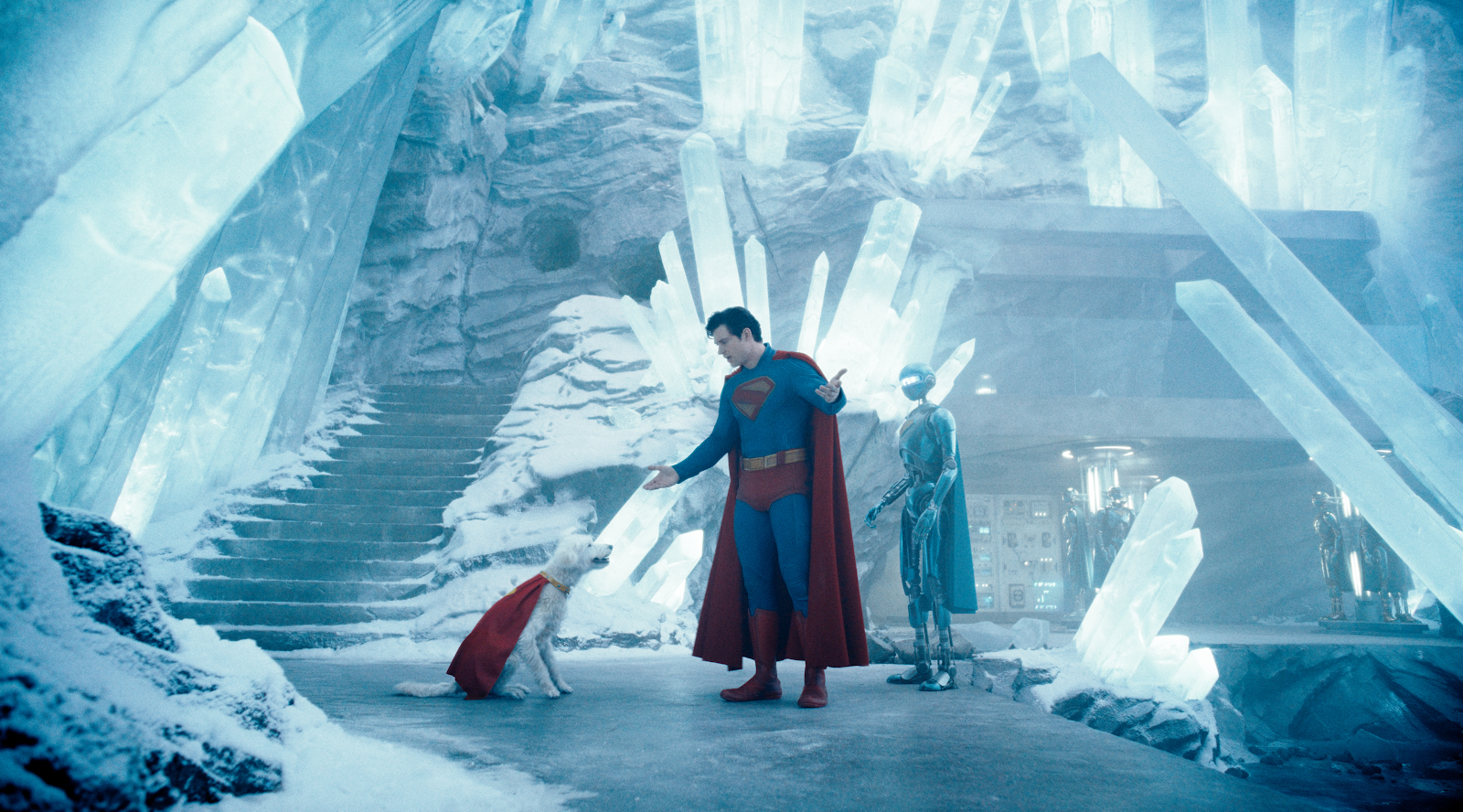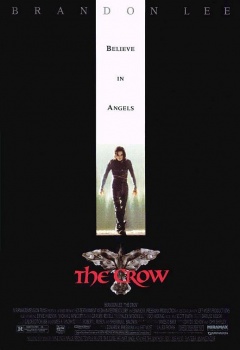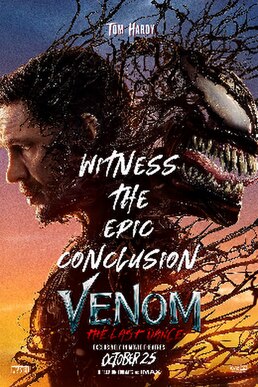SUPERMAN (2025)When Mario Puzo, author of The Godfather, was working on the story and script for the original Superman, he remarked that Kal-El's origin story was a great tragedy. I got a similar feeling while watching the newest Superman, that it too was a great tragedy. However, I did not mean it the same way as Puzo. Superman is a great tragedy because the people behind it lost a great opportunity to reinvigorate this character.
Superman (David Corenswet) has been defeated by the "Hammer of Boravia", a machine sent by the malevolent country to stop Superman from interfering with its invasion of neighboring Jarhanpur. His loyal dog, Krypto, spirits him away to the Fortress of Solitude, where Superman's robots help him recover. Once more into the breach, Superman takes on the Hammer which is really Ultraman. Ultraman is controlled by tech billionaire Lex Luthor (Nicholas Hoult), who harbors a passionate hatred for the Man of Steel.
One person who does not hold a passionate hatred for the Man of Steel is intrepid Daily Planet reporter Lois Lane (Rachel Brosnahan). Lois is so intrepid that she is fully aware that Superman is the true identity of her fellow Daily Planet reporter Clark Kent, with whom she is having a clandestine affair. She is not pleased that Clark interviews himself as he is essentially interviewing himself. She also is not keen on him getting involved in the Barista/Jodhpur war (by this time I stopped bothering to remember the nations and started calling them "Barista" and "Jodhpur").
A battle between a new monster and the combined forces of Superman and the "Justice Gang" is really a distraction for Luthor, his main henchman the Engineer (Maria Gabriela de Faria) and Luthor's Instagram-mad mistress Eve Teschmacher (Sara Sampio) to break into the Fortress of Solitude. Here, they come upon the message that Kal-El (Superman on his native planet of Krypton) had from his parents Jor-El (Bradley Cooper) and Sara (Angela Sarafyan) sent with him. That message has been garbled, but The Engineer has figured it out.
Superman was not sent to Earth to escape Krypton's destruction or help the Tellurians. He was sent to knock up every woman and rule over humanity as their overlord. This news shocks the world. It shocks Superman as well. This news, however, causes Superman to allow himself to be taken into custody. To his shock and horror, the custody will be run by Luthor, who imprisons Superman in a pocket universe.
Now it is up to Lois and the Justice Gang members to save the world and Superman. Justice Gang ringleader Guy Gardner (Nathan Fillion), a Green Lantern, is not keen on involvement. His fellow Justice Gang member Mr. Terrific (Edi Gathegi) alleges that he too is not interested in involvement, but he does so in part to spite Gardner. The final Justice Gang member, Hawkgirl (Isabela Merced) is generally uninterested in either side. Mr. Terrific and Lois eventually manage to get Superman and Krypto out of the pocket universe.
That, however, leads to the pocket universe starting to enter our world. This will mean the end of the world as we know it, but no one save Luthor is feeling fine. Will Superman, along with the Daily Planet staff and the Justice Gang, be able to defeat Luthor? Will they also stop Israel, I mean Boravia, from destroying Gaza, I mean, Jarhanpur?
I cannot say that writer/director James Gunn intended for
Superman to go wrong but go wrong it did. My sense is that Gunn and everyone involved behind the scenes in
Superman went against what original
Superman creative consultant Tom Mankiewicz observed. He said that (the filmmakers) cannot be smarter than the material. You have to take the premise seriously, though you can have funny moments.
Superman, conversely, has plenty of moments that are meant to be funny, but which are not. The quipping between Superman and his various robots was not funny. Krypto's dominance in the film was not funny. The commenting about the name "Justice Gang" (which no one apart from Gardner liked) was not funny. Sight gags, such as how Mr. Terrific's garage door opened slowly, were not funny. When the second monster was unleashed, I thought they had brought in Stich to do battle with Superman.
It is surprising to me that people could botch such a simple assignment as Superman. I think it goes to again, the idea that they thought they had to be smarter than the material. It might also be the current notion to make this expansive universe versus a straightforward Superman vehicle. We had cameos from John Cena as Peacemaker. The film started with Superman being beaten down. You had Jimmy Olsen (Skyler Gisondo) being some sort of sexual catnip to all the women. He had Eve Teschmacher under his spell.
All that is already curious. The problem that I saw is that Superman is essentially a supporting character in his own film. I presume that the Justice Gang was not actually the more dominant part of Superman. However, it felt that way at times. In a strange way, I felt that Superman was less about Superman and more about Krypto. A lot of time and energy were spent focused on the Super Dog versus the Super Man.
It did not help that
Superman has him beaten and battered often. The film starts with him getting battered by Ultraman. He gets beaten by the Justice Gang. He gets beaten by both Luthor and Metamorpho (Anthony Carrigan), a fellow alien in the pocket universe who can turn himself into Kryptonite. He gets beaten up by what we discover are Superman clones, created by Luthor to anticipate all his actions. This is not a Superman. This is a Super Wimp.
As a side note, the way that Lex Luthor managed to create these clones is, intentionally or not, reminiscent of how Gene Hackman's Lex Luthor did the same thing in Superman IV: The Quest for Peace.
One thing that was quite frustrating was how we are told one thing only to see that violated. When Mr. Terrific and Lois are looking into the pocket universe, we are told that a river within that universe would kill anything that comes into contact with it. Guess who falls into that river and manages to survive.
I think the actors did their best with what they had. David Corenswet does look the part. He does have an earnestness and sincerity that the character should have. I do question why, as Clark Kent, he has such a deep and commanding voice. I am aware that Lois is fully aware of Clark Kent's other identity. However, there was very little of Clark Kent in Superman.
As another side note, I do wonder why Gunn decided to essentially start our story
in medias res. How DOES Lois discover Superman's other identity? Why, apart from what I understood to be jealousy, does Luthor harbor such hatred towards the Man of Steel? How did Jimmy Olsen of all people turn into such a super-slut where women find him irresistible? When it came to Luthor's mistress Eve Teschmacher, I spent much of the film wondering if she was his girlfriend or his sister. Either way, I got flashbacks to the two female roles in
Superman III as she could have been either.
Corenswet was well-matched with Nicholas Hoult. Hoult was appropriate in his raging and malevolent turn as Lex Luthor. Brosnahan, conversely, was blank as Lois Lane. I did not care for Nathan Fillion or Isabela Merced's Hawkgirl. The former worked too hard to be abrasive, the latter was almost an afterthought. Gathegi was, along with Corenswet and Hoult, a standout as Mr. Terrific. He has a serious manner that works within the film. Mr. Terrific is not introduced in Superman, though to be fair no one is. As such, his mix of deadpan seriousness with actual skills showcases an interesting character.
Superman, to my mind, is a lost opportunity. You can't thrill to a film that has a pocket universe where monkeys are typing out anti-Superman tweets. You don't care about the conflict that Superman is attempting to stop. If people want to draw a parallel between the Barista/Jodhpur war and Israel/Hamas, they are free to do so. I did not care and don't understand why Superman would side with one side over the other. At one point in the film, Superman insists that he is punk rock.
Superman is less punk rock as he is yacht rock.
DECISION: D+ (3/10)



_poster.jpg)



.jpg)











_film_poster.jpg)












_poster.jpg)


